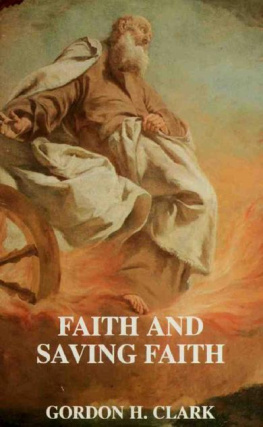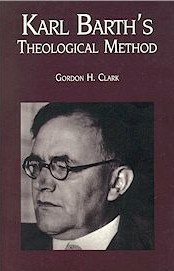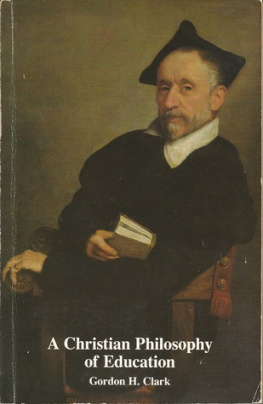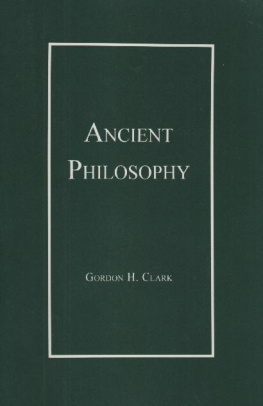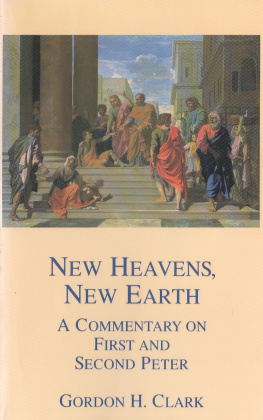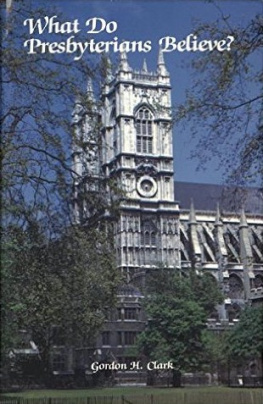Gordon H. Clark - Title: Essays on ethics and politics
Here you can read online Gordon H. Clark - Title: Essays on ethics and politics full text of the book (entire story) in english for free. Download pdf and epub, get meaning, cover and reviews about this ebook. year: 1992, publisher: Trinity Foundation, genre: Science. Description of the work, (preface) as well as reviews are available. Best literature library LitArk.com created for fans of good reading and offers a wide selection of genres:
Romance novel
Science fiction
Adventure
Detective
Science
History
Home and family
Prose
Art
Politics
Computer
Non-fiction
Religion
Business
Children
Humor
Choose a favorite category and find really read worthwhile books. Enjoy immersion in the world of imagination, feel the emotions of the characters or learn something new for yourself, make an fascinating discovery.
- Book:Title: Essays on ethics and politics
- Author:
- Publisher:Trinity Foundation
- Genre:
- Year:1992
- Rating:4 / 5
- Favourites:Add to favourites
- Your mark:
- 80
- 1
- 2
- 3
- 4
- 5
Title: Essays on ethics and politics: summary, description and annotation
We offer to read an annotation, description, summary or preface (depends on what the author of the book "Title: Essays on ethics and politics" wrote himself). If you haven't found the necessary information about the book — write in the comments, we will try to find it.
Title: Essays on ethics and politics — read online for free the complete book (whole text) full work
Below is the text of the book, divided by pages. System saving the place of the last page read, allows you to conveniently read the book "Title: Essays on ethics and politics" online for free, without having to search again every time where you left off. Put a bookmark, and you can go to the page where you finished reading at any time.
Font size:
Interval:
Bookmark:
Gordon H. Clark
John W. Robbins, Editor
The Trinity Foundation Jefferson, Maryland
Cover: The Battle of La Hogue Benjamin West
National Gallery of Art, Washington, D.C. Andrew W. Mellon Fund
Essays on Ethics and Politics 1992 John W. Robbins
ISBN: 0-940931-32-X
The evening news and the daily paper testify to the collapse of morality in America. The alarming statistics on crime, abortion, taxation, and debt; the vociferous homosexual, feminist, environmentalist, and socialist movements; the lewd and violent television programs, movies, and books; the growing numbers of illegitimate births, homosexual marriages, unjustified divorces, and deaths by drunken driversall these things are evidence that America is caught in a moral maelstrom and may soon disappear beneath the flood.
How has this happened? How did a nation founded by Pilgrims, Puritans, and Presbyterians come to be dominated by impuritans? It did not happen overnight. It has not been only in the last two or three decades that the problem began; it has been a long time coming.
The story begins, as all stories do, with theology. America lost her ethics because she first lost her religion. Of course, there have always been unbelievers in America and they have usually been in the majority. But in the nineteenth century something new happened. Clergymen and the churches, whose duty it is to defend the truth against unbelief, not only failed to do so, they, too, became unbelievers and they began to attack the truth. The treason of the clerics became blatant in the twentieth century. Central to that betrayal was their rejection of the Bible as the infallible revelation of God. If the Bible is an untrustworthy book, a book not to be believed, all the other doctrines of Christianity including its system of ethicscannot stand. Gone are the promise of eternal life, the final judgment, the deity of Christ, the threat of hell, and the sovereignty of God. Gone, too, are the Ten Commandments. The prologue to the Ten Commandments states the ground of their authority: I am the Lord. Theology, not ethics, is of fundamental importance; once an individual or a nation rejects Christian theology, he has no basis for maintaining Christian ethics. The validity of the Ten Commandments depends upon the fact that their author is indeed the Lord. Were that not the case, the Commandments would have no authority to require anyones obedience.
Once the clerics and the churches abandoned Christianity, the moral decline of America was a foregone conclusion. Instead of churches being the salt of the earth, they became its fertilizer. We ought not be surprised that the weeds of crime, violence, greed, lust, and envy are flourishing: The churches and the clerics, by their unbelief, are feeding, watering, and cultivating them.
All of this has one rather obvious implication: If America, if the world, is to be pulled from the cesspool, it will not be accomplished by legislation, no matter how good, nor by repeated exhortations to traditional morality, nor even by preaching obedience to the moral law, no matter how vigorously. America has lost her way because she first lost her faith. And if that faith is to be recovered, it will be only through the preaching of the Gospel the Biblical Gospel, not the various perversions taught in both liberal and conservative, Protestant and Catholic, modernist and evangelical churches today. No man or nation can save itself. No individual and no people can earn eternal or temporal salvation by good works. The Gospel alone is the power of God, and through its accurate preaching and publication, many will be granted faith.
Ironically, the cure for Americas immorality is not more law, but more belief in the truth. Faithbeliefcorrect theology is fundamental. Anything else is treating the symptoms, not the cause, of our present condition. The ideas expressed so often in advertising and in popular culture must be rejected and replaced by Christian ideas: Atheism: You only go round once, so grab all the gusto you can get. Irrationalism: Why ask why? Turn on, tune in, drop out. Self-indulgence: Gotta have it. Buy now, pay later. Hedonism: Try it, youll like it. If it feels good, do it. Our job as Christians is to replace those slogans and ideas with Christian ideas. Once people know who God is, we will have no major problems with ethics.
Dr. Gordon H. Clark was perhaps the greatest Christian philosopher and theologian America has produced. Over the course of his life he wrote hundreds of articles and essays, some of which directly concern ethics and politics. This collection of forty-three essays is a major statement of Christian ethics. In them he refutes the arguments of both secular and religious thinkers who attempt to construct ethical systems apart from revelation. He shows that there is no possibility of ethical knowledge or action apart from the Bible. The Bible alone is the source of truth: neither tradition, nor church, nor natural law, nor human opinion can provide us with the information we need to tell right from wrong.
Clark also shows that the Bible is a package deal: One cannot consistently accept the Eighth CommandmentYou shall not stealwithout also accepting the firstI am the Lord your God; you shall have no other gods before me. Ethics depends on theology; theology does not depend on ethics. If we pray for a recovery of Christian morality in the world, we must first pray for a recovery of Christian belief. Gods law is fine, but it is inadequate: Gods truth comes first.
John W. Robbins February 1992
Activism like its opposite, Quietism, comes in degrees. In its extreme form Quietism advocates the cessation of all volition and desire. Absorption by God is virtually Buddhist Nirvana in Christian dress. The extreme form of Activism would be a life all of action and volition minus any knowledge of what one is doing or should do. Obviously Christianity is neither the one nor the other. Disagreement concerning proportions oscillates between ivory-tower intellectuals and non-intellectual activists. In general European evangelicals are more intellectual while American evangelicals, even though they do not engage in the liberals noisy demonstrations, are strongly activist.
Bakers Dictionary of Christian Ethics, Carl F.H. Henry, editor. Grand Rapids, Michigan: Baker Book House, 1973, p. 7.
Altruism as an ethical theory arose in late seventeenth century England. In reaction to Thomas Hobbes psychological hedonism, altruism tried to prove the existence of natural impulses to do good to other people. Hobbes had held that all natural impulses and motives are self-seeking. He had expressed himself, as one critic put it, in"delightfully repulsive terms. For example, Pity is "the imagination of future calamity to ourselves proceeding from the sense of another mans calamity. Again he asserted that "the passion of laughter proceedeth from the sudden imagination of our own odds and eminency.
Francis Hutcheson (1694-1747) argued: "Had we no sense of good distinct from the advantage or interest arising from the external senses... our admiration and love toward a fruitful field or commodious habitation would be much the same with what we have toward a generous friend or any noble character.... we should have the same sentiments and affections toward inanimate things which we have toward rational agents; which everyone knows to be false.
Hutchesons argument is obviously unsatisfactory, and Bishop Butler (1692-1752) removed the problem by identifying the effects of self-love and conscience. "Self-love then, though confined to the interest of the present world, does in general perfectly coincide with virtue.... Whatever exceptions there are to this, which are much fewer than they are commonly thought, all shall be set right at the final distribution of things.... Conscience and self-love, if we understand our true happiness, always lead us the same way.
Font size:
Interval:
Bookmark:
Similar books «Title: Essays on ethics and politics»
Look at similar books to Title: Essays on ethics and politics. We have selected literature similar in name and meaning in the hope of providing readers with more options to find new, interesting, not yet read works.
Discussion, reviews of the book Title: Essays on ethics and politics and just readers' own opinions. Leave your comments, write what you think about the work, its meaning or the main characters. Specify what exactly you liked and what you didn't like, and why you think so.


